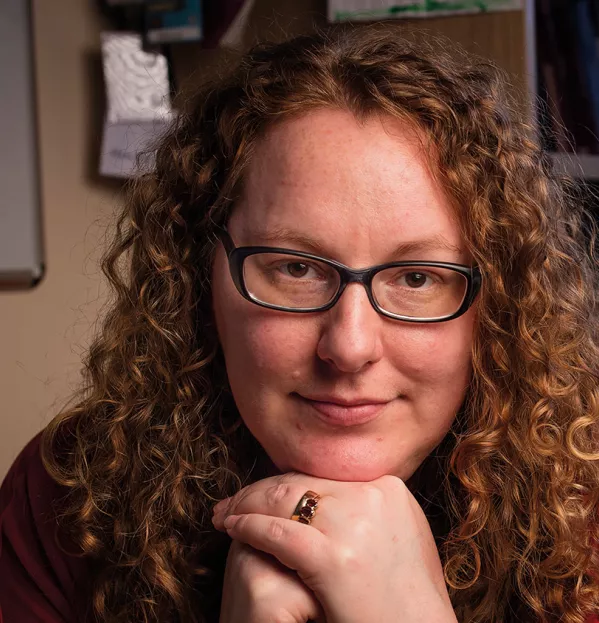TES talks to... Sue Fletcher-Watson

Sue Fletcher-Watson is choosing her words carefully. The developmental psychologist is talking about whether children who are born prematurely would benefit from the school being told of the fact. It is a tricky issue: on the one hand, you don’t want to label a child unnecessarily, but on the other, such a label might help those preterm babies who struggle at school to get the support they need.
“It would mean these children would get identified more quickly and could be referred for the extra help they need,” she explains. “But this might also just a) stigmatise those kids unfairly, or b) put undue pressure on teachers to respond to another bit of information without having the tools to do so.”
Discussions like this around educational outcomes for those children born preterm don’t happen enough, according to Fletcher-Watson. Currently, we know too little about how premature birth might affect children when they reach school, so those children that do experience problems - she says about half of children born preterm may fall into this category - often end up either misdiagnosed or having their problems ignored or missed.
‘No infrastructure’
“So many babies are resilient to this incredible disadvantage, this incredibly difficult start to life, and still go on to thrive and succeed academically, physically and in all sorts of ways,” says Fletcher-Watson. “[But] I think there could well be groups of children whose difficulties aren’t exactly going unnoticed, but it’s just that there’s no infrastructure in place to identify and support them. So they’re maybe just allowed to be bottom of the class. And that’s really sad if there’s more that we could be doing to help them feel more confident and more included, and to help them achieve their goals.”
There’s an argument that we should be considering a completely separate clinical category for some children born preterm
At the moment, she explains, many children who were born preterm do not receive the support they need because they don’t quite meet the profile of any existing special educational needs and disability category.
While a small number of children who are born early will have complex developmental difficulties that can be identified in the first couple of years of life, for the majority who experience challenges, the effects are much more subtle; difficulties might not be apparent until the child starts school. She says this means that these children often end up being the quiet pupil at the back of the class who is struggling in silence.
A drive to support struggling children underpins all of Fletcher-Watson’s research. She first worked with children with developmental disabilities when she was 17 years old and started to volunteer with Oundle School Mencap Holiday, a charity that runs residential trips for children and young people with learning and physical disabilities. Her involvement with this charity lasted 21 years (she was a trustee from 2006 until 2016), and her experiences as a teenage volunteer were part of what inspired her to study psychology and focus on autism spectrum disorders for her PhD at Durham University. It was her research into autism that, in a roundabout way, first led her to study prematurity.
“Autism doesn’t really get reliably diagnosed until a child is about three years old. This is a real obstacle to enhancing understanding and providing meaningful support to children and their families,” says Fletcher-Watson. “In prematurity, we know [children] are premature when they are born. Which led me to think, why on earth don’t we know more about these babies?”
Tracking preterm children
To answer this question, Fletcher-Watson began a study following children who were born early - her current recruitment is for children born at 32 weeks, eight weeks before their due date. She has been following the first cohort for the past five years, so there is still much to learn about how this group will cope in the classroom, but her research is already offering some insights that could be a useful starting point for teachers to better support premature children who struggle at school.
Currently, if children born preterm are identified as having problems at school, they can be misdiagnosed - for example, some might be diagnosed with autism.

“The patterns of challenge that they experience are very much in the autism domain - often problems with their social and emotional development and relationships with other people,” says Fletcher-Watson.
Others might show problems with their attentional focus and, as a result, can be diagnosed with attention deficit hyperactivity disorder (ADHD).
In reality, Fletcher-Watson says, the profile of premature children who experience difficulties is often subtly different to children with autism or ADHD. Although those who receive a diagnosis for one of these conditions will at least receive some support, which might be very relevant to them, it is not quite the personalised assistance that they would receive in an ideal world.
“Should clinicians be thinking about creating a new diagnostic category, one that would reflect a combination of being born early and developing a specific pattern of difficulties, which spans features of both autism and ADHD but isn’t quite the same as either of those?” asks Fletcher-Watson.
“I think that there’s an argument that we should be considering a completely separate clinical category for [some] children who are born preterm.
“On the whole, my personal feeling is that a label - to the extent that it allows people around you to be more supportive and to be more understanding, and to create an environment where you can thrive - can be a really beneficial thing.”
‘Dose dependent’ effect
However, telling a school that a child was born preterm can have detrimental effects, too, she points out. The whole situation is made more complex by the fact that there is no clear relationship between prematurity of birth and level of difficulty experienced by the child.
“There is what you might call a ‘dose dependent’ effect,” says Fletcher-Watson. “The earlier you are born, the greater the risk of you having some sort of non-optimal educational outcome.
There’s a real risk that you place a heavy burden on teachers to deal with yet another variable in an already very complex classroom
“But it’s not such a clear relationship that you could just say: OK, we’ll take all the children born under 32 weeks and give them extra pre-school support to help them reach their full potential. You’ve still got a high proportion of children, even born at 23 or 24 weeks, who go on to do great at school.”
While it is not yet clear exactly what makes some premature children perform better than others - although there is evidence that weight at birth can have an impact, with heavier children tending to do better - research suggests that certain things, such as deferring school entry, might have a negative impact.
A recent study followed premature children who attended school according to when they were born, and those who deferred entry to match the school year for which they were due (bit.ly/SchoolPremature).
In the first year of school, the premature children who had delayed entry were performing the same as premature children who went to school at the usual time. But by the time the same children were eight years old, those children who had deferred entry were doing less well.
This, Fletcher-Watson says, could be down to the importance of age-appropriate factors and the need for children to be with their peer group.
If deferred entry might not be the answer to improving outcomes, would a greater awareness of potential problems mentioned above be of more use? She and her team have discussed the benefits of asking parents to tick a box on school entry forms if their child was born more than three weeks early. But she is hesitant about taking the idea further.
“As a parallel, it might be helpful to think of children with English as an additional language (EAL),” she says. “If teachers know that a child learned English second, they might be alert to signs that they are struggling in some classroom areas, and this information would be useful for their practice.
“It doesn’t mean every kid with EAL is presumed to be failing in school, nor that they are getting a diagnosis of a language disorder, or anything else. It is just a useful flag to help a teacher know how to adjust their practice to support their students.
“[But] one of the problems with that is that it’s not clear at all what we would expect a teacher to do with that information. I think there’s a real risk that you place quite a heavy burden on teachers to deal with yet another variable in an already very complex classroom.”
Clearly, this is an incredibly complicated area that is still in need of more research. Thankfully, we are catching up, but in the meantime, that complexity might mean many children who are born prematurely are being misdiagnosed, or their challenges at school missed altogether. These children are still struggling and teachers have little in the way of support or guidance to help them.
Helen Amass is deputy features editor at Tes. She tweets @helen_amass
You need a Tes subscription to read this article
Subscribe now to read this article and get other subscriber-only content:
- Unlimited access to all Tes magazine content
- Exclusive subscriber-only stories
- Award-winning email newsletters
Already a subscriber? Log in
You need a subscription to read this article
Subscribe now to read this article and get other subscriber-only content, including:
- Unlimited access to all Tes magazine content
- Exclusive subscriber-only stories
- Award-winning email newsletters